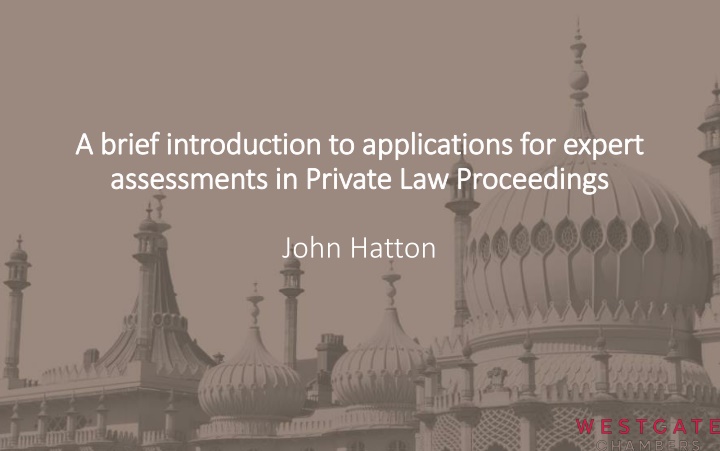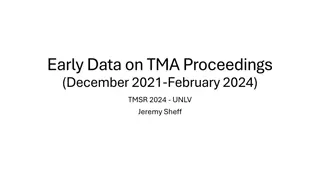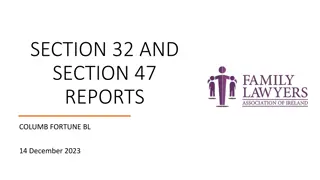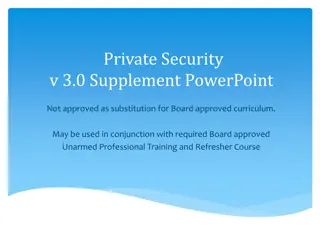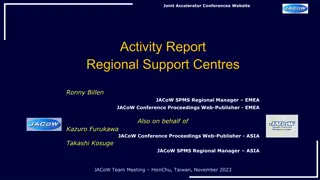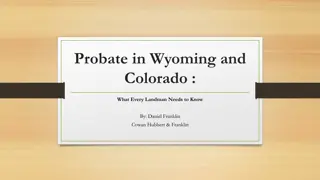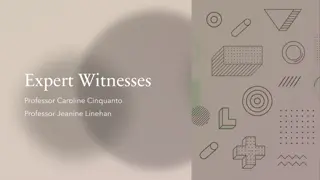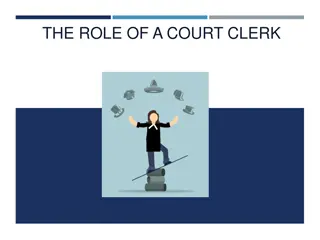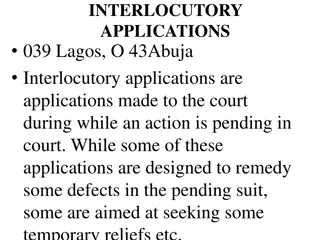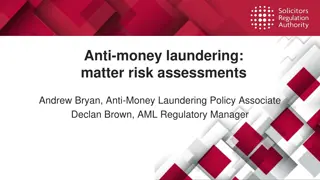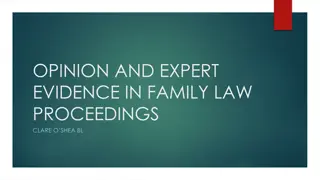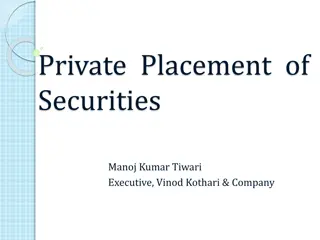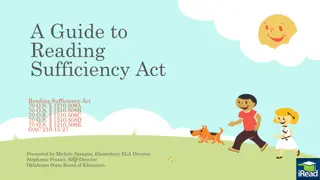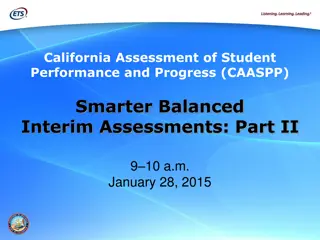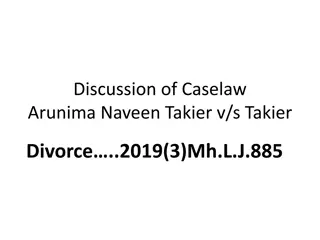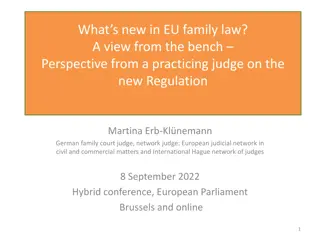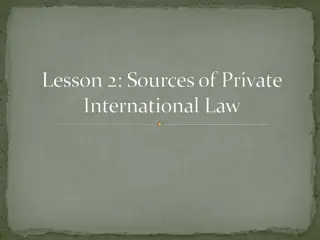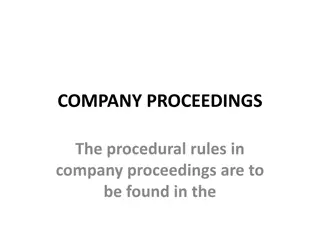Applications for Expert Assessments in Private Law Proceedings
Understanding the necessity and process of expert assessments in private law proceedings, including the criteria for when an expert may be needed, the sort of issues they can report on, and when the application should be made. Draft guidance on responding to allegations of alienating behavior is also highlighted.
Download Presentation

Please find below an Image/Link to download the presentation.
The content on the website is provided AS IS for your information and personal use only. It may not be sold, licensed, or shared on other websites without obtaining consent from the author.If you encounter any issues during the download, it is possible that the publisher has removed the file from their server.
You are allowed to download the files provided on this website for personal or commercial use, subject to the condition that they are used lawfully. All files are the property of their respective owners.
The content on the website is provided AS IS for your information and personal use only. It may not be sold, licensed, or shared on other websites without obtaining consent from the author.
E N D
Presentation Transcript
A brief introduction to applications for expert A brief introduction to applications for expert assessments in Private assessments in Private L Law Proceedings aw Proceedings John Hatton
Introduction Purpose of this talk Topics to be covered
Necessity Necessity WHEN WHEN MIGHT MIGHT AN AN EXPERT EXPERT BE BE NEEDED? NEEDED? An order authorising expert evidence will only be made where it is necessary to assist the court to resolve the proceedings justly (see FPR 25.4(3) for non-children proceedings; section 13(6) of the Children and Families Act 2014 for children proceedings). Such expert evidence will only be necessary where it is demanded by the contested issues rather than being merely reasonable, desirable or of assistance (Re H-L (A Child) [2013] EWCA Civ 655). Section 13(7) Children and Families Act 2014 criteria summarised: What impact will the instruction have on the welfare of the child(ren)? What is the ambit of the proposed assessment what issue will they help the court determine? What other evidence is available? What impact will the assessment have on the timetable for proceedings? What is the cost of assessment? Any other matters prescribed by the Family Procedure Rules?
What sort of issues might an What sort of issues might an expert report on? expert report on? Mental health issues Behavioural/psychological issues Drug/alcohol testing Parenting capacity Others
When should the When should the application be made? application be made? Generally Generally to to inform inform the the welfare welfare stage stage what what is is the the risk risk of of harm harm and and how how can can it it be be mitigated? mitigated? Does Does there there need need to to be be an an established established factual factual matrix matrix from from which which the the expert expert can can work? work?
Note Note on on draft draft guidance guidance: : Draft Draft Guidance Guidance on on Responding Responding to to allegations allegations of of alienating alienating behaviour behaviour August August 2023 2023: :- - The focus has been to provide practical guidance as to how allegations of alienating behaviours are responded to; recognising that they are allegations that can arise at different points in the litigation journey and are likely to be made alongside other allegations of harmful behaviour including domestic abuse or child abuse. The factual matrix surrounding a case of alleged alienation is one for the court alone. In the same way that the court must, at the first opportunity, gather evidence and list a fact- finding hearing where other forms of abuse are alleged, the court must gather the evidence and make findings in relation to alienating behaviours. Where the court has made findings of any form of abuse, including, but not limited to, domestic abuse, sexual violence or alienating behaviours, the court will need to consider whether further or other evidence is needed for the court to conduct a proper welfare evaluation . [See [See Appendix Appendix 1 1: : Mapping Mapping the the litigation litigation journey journey where where Alienating Alienating Behaviours Behaviours (AB) (AB) are are alleged alleged, , extract extract from from draft draft guidance guidance August August 2023 2023] ]
Case Case note note: : R Re e C C ( ( P Pa ar re en ntal tal A Ali lie en na at ti io on n ; ; I Ins nst tru ruc cti tion on o of f E Ex xp pe ert rt) [ [2 20 02 23 3] ] E EW WH HC C 3 34 45 5 (F (Fam) am) [See [See Appendices Appendices 2 2 & & 3 3: : Family Family Law Law Week Week Case Case Summary Summary and and Judgment Judgment from from Bailii Bailii] ] Key point: The President said the following argument advanced on behalf of the ACP ought to be widely understood and accepted: The decision about whether or not a parent has alienated a child is a question of fact for the Court to resolve and not a diagnosis that can or should be offered by a psychologist. For these purposes, the ACP-UK wishes to emphasise that parental alienation is not a syndrome capable of being diagnosed, but a process of manipulation of children perpetrated by one parent against the other through, what are termed as, alienatingbehaviours . It is, fundamentally, a question of fact.' [ [ p p. .103 103] ]
IDENTIFYING THE EXPERT IDENTIFYING THE EXPERT Does the person who is subject of assessment have specific characteristics which need to be taken into account? Does the proposed expert have the relevant knowledge and expertise?
Presidents President s Memorandum Memorandum: : Experts Experts in in the the Family Family Court Court, , October October 2021 2021: : The Family Court adopts a rigorous approach to the admission of expert evidence. As the references in this memorandum make plain, pseudo-science, which is not based on any established body of knowledge, will be inadmissible in the Family Court. Case Case Note Note: : Kennedy Kennedy v v Cordia Cordia (Services) (Services) LLP LLP (Scotland) (Scotland) [ [2016 2016] ] UKSC UKSC 6 6. . The expert must demonstrate to the court that he or she has the relevant knowledge and experience to give either opinion evidence, or factual evidence which is not based exclusively on personal observation or sensation. Where the expert witness establishes such knowledge and experience, he or she can draw on the general body of knowledge and understanding of the relevant expertise [ [ p p. .50 50] ] Where the subject matter of the proposed expert evidence is within a recognised scientific discipline, it will be easy for the court to be satisfied about the reliability of the relevant body of knowledge. There is more difficulty where the science or body of knowledge is not widely recognised. The court will refuse to authorise or admit the evidence of an expert whose methodology is not based on any established body of knowledge [ [ pp pp. . 54 54 56 56] ]
Case Case Note Note: : R Re e C C ( ( P Pa ar re en ntal tal A Ali lie en na at ti io on n ; ; I Ins nst tru ruc cti tion on o of f E Ex xp pe ert rt) [ [2 20 02 23 3] ] E EW WH HC C 3 34 45 5 (F (Fam) am) From the perspective of the court, and it may be from a wider public perspective, the open-house nature of the term psychologist is unhelpful and potentially confusing. In other fields, particularly medicine, the court is used to a stricter regulatory scheme in which an individual can only call themselves by a professional title, for example paediatrician, or pathologist, if recognition of their expert status is confirmed and monitored through formal regulation and registration. It is, however, a matter for the psychological profession and, ultimately, Parliament, whether a tighter regime should be imposed [ [ p p. .94 94] ] The expert s CV needs to be clear.. It needs to set out clearly the expert s qualifications and experience [ [ p p. .97 97] ] HCPC registration, or chartered status in the BPS, provide a reliable, one-stop, method of authentication. Where a potential expert is registered with the HCPC as entitled to hold themselves out as an expert under one of the protected titles, this can be taken as sufficient qualification to offer an opinion within that field of practice A psychologist s CV should, therefore, prominently highlight whether they are HCPC registered or not. It is incumbent on an un-registered psychologist to assist the court by providing a short and clear statement of their expertise [ [ p p. .97 97] ] It is not, however, for this court to prohibit the instruction of any unregulated psychologist This is not, however, an open house and there is a need for caution. In every case the court should identify whether a proposed expert is HCPC registered. A sensible practice, where the expert is un-registered, is for the court to indicate in a short judgment why it is, nevertheless, appropriate to instruct them [ [ p p. .98 98] ]
C Conflicts onflicts of of interest interest Interim Interim Guidance Guidance in in relation relation to to expert expert witnesses witnesses in in cases cases where where there there are are allegations allegations of of alienating alienating behaviours behaviours conflicts conflicts of of interest, interest, May May 2022 2022 Recommendations for interventions deliverable only by the instructed expert or their associates increase the risk of bias, can limit appropriate oversight of interventions and risks delays as it may create barriers to families accessing appropriate, timely support local to them. The court should be extremely cautious when asked to consider assessment and treatment packagesoffered by the same or linked providers. It should be noted that differentiation of roles between assessor and intervention is consistent with therapeutic practice outside of the family court arena. It is common practice within services that support children and families, e.g., CAMHS, that the initial assessment is completed by a different practitioner to the one who ultimately delivers an intervention, e.g. the Choice and Partnership Approach
Avoiding conflicts of Interest Avoiding conflicts of Interest P Pr ra ac ct ti ic ce e D Dir ire ec cti tio on ns s - The Experts Practice Direction, PD25B, para 9.1 requires four declarations. This includes a declaration that the expert has no conflict of interest of any kind, and the mandatory wording of a Statement of Truth. L Le ett tte er r o of f I In ns str tru uc cti tio on n - The court is required to carefully consider the narrative and questions within the letter of instruction to ensure that it identifies the issues and preserves the independence and integrity of the assessment. S Sc cr ru uti tin ny y o of f fu furt rthe her r r re ec co om mme men nde ded d w wo ork rk - The court should be mindful that any program of work proposed by an expert that raises a professional conflict is contrary to best practice and challenges the integrity of any updating expert opinion.
Costs HOW HOW WILL WILL THE THE ASSESSMENT ASSESSMENT BE BE FUNDED? FUNDED? The costs involved with obtaining an expert s report are usually significant. Careful thought needs to be given to how an assessment will be funded. If both parties are legally aided and the expert has agreed to report within the Legal Aid Agency s codified rates, costs should be straightforward. Some potential issues may arise in the following circumstances, for example: Rates in excess of codified rates Experts not listed in the renumeration regulations Is one or more of the parties a litigant in person? Some Some ideas ideas to to help help address address some some of of the the difficulties difficulties: : Toxicology at GP? Applications for prior authority Appointing a 16.4 guardian? Funds held on account?
CONCLUSION, ANY QUESTIONS, AND THANK YOU. CONCLUSION, ANY QUESTIONS, AND THANK YOU.
